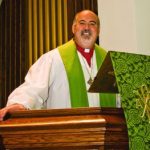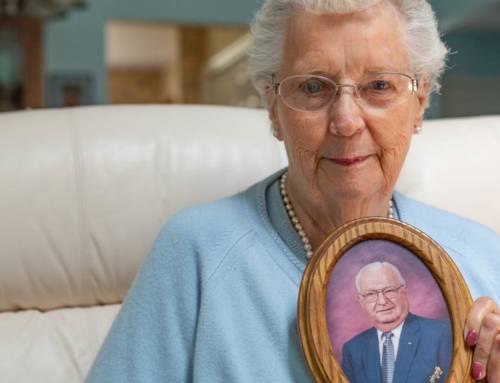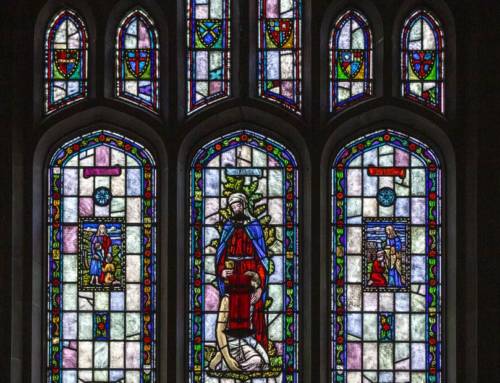
About the Author: Sunday Sermons from Sell Chapel are written by Rev. Preston Van Deursen, Director of Pastoral Care at the Masonic Village at Elizabethtown.
A good philosopher will tell you that knowing the right questions demonstrates more wisdom than knowing the right answer!
I’m not sure which comedian it is, but one of them has a line of unanswerable questions that goes like this: Why do we say that something is out of whack? What is whack? When someone asks you, a penny for your thoughts, and you put your two cents in, what happens to the other penny? When cheese gets its picture taken, what does it say? Why is it that if someone tells you that there are one billion stars in the sky you will believe them but if they tell you a wall has wet paint… you have to touch it to be sure?
Not every question is made to be answered. And the question that is placed before Jesus in today’s gospel falls into that category. The question is Why? Why is there suffering in the world? Why do good people die? Why do the innocent suffer as much- if not more- than the guilty?
According to Luke, many thousands of people had gathered to hear Jesus teach. Many in the crowd were passing along the news of a recent tragedy: Pilate’s soldiers had killed some Galilean Jews while they were offering sacrifices in the Temple. The question that troubled the crowd was, why did God allow this happen? Had these people committed some terrible sin? Surely that was the only way to explain their horrible death. Why did this happen? And here is where we begin today, with this simple assertion: There are some questions that will never be answered. Not in this world, anyway. Of course, that doesn’t keep people from trying.
In the movie, “Oh, God“, George Burns, who plays the part of God, is asked by a tiny girl why bad things happen. Burns replies, “That’s the way the system works. Have you ever seen an up without a down? A front, without a back? A top without a bottom? You can’t have one without the other. If I take away the sad, then I have to take away the happy too. They go together.” Then with a wry smile, Burns adds, “If somebody has a better idea, I hope they put it in the suggestion box.” Obviously “Oh, God” was never meant to be a theological film, but it does put into perspective that there is no answer to that little girl’s question. We don’t know why bad things happen.
In his spiritual autobiography, William Barclay tells of watching his mother die an agonizing death with cancer of the spine. Through the tragedy, he came to face to face with questions which he never solved. Why should his mother, a good woman and otherwise in good health, be forced to die a painful death like that, and just as her son was about to become a preacher. His father wisely said to him, “You’ll have a new note in your preaching now.” And he did. Barclay writes, “And so I had… not the note of one who knew the answers and had solved the problems, but the note of one who now knew what the problems were.” He didn’t have the answer but at least now, he understood the question …. as only one can who has walked through that long, dark valley of watching a loved one suffer.
If there is one area in which science and theology share common ground, it is the area of mystery. One of the greatest American physicists, Dr. Edward Teller, was a key scientist in ushering in the atomic age. Speaking to three hundred of the brightest high school seniors is America at a conference, Dr. Teller challenged them, “Become scientists, and all your life remember these words: I don’t know.” Those are good words. I don’t know. There are some things that even the brightest and best scientists and theologians just don’t know.
Just as there are some questions that we don’t have the answers for, we also need to see and understand that there are tragedies that come into our lives for which we are not responsible for! It is not our fault! No matter how much blame or guilt we want to invoke upon ourselves.
Did you know that children who are suffering from pain or disease will often believe that it is because they have done something wrong to deserve their distress? In a book on the experiences of hospitalized children, a pediatric nurse describes Danny, a two-year-old leukemia victim. As the nurse pierced his tiny arm with an intravenous needle to begin still another painful round of chemotherapy, Danny screamed over and over again, “I’m sorry! I said I’m sorry.!” Danny was convinced that his pain was punishment for something he had done.
In 1976, twenty-six California children were kidnaped at gunpoint by three masked men who took over the school bus on which they were riding. The victims were buried in a hole, which was actually a truck trailer placed underground and covered with a layer of earth. After sixteen hours, the kidnappers finally left and the terrorized children dug themselves out. One child, an eleven-year-old girl, had argued bitterly with her mother on the morning of the kidnaping, and she had left for school screaming, “You’re the meanest mother in the world!” For years afterwards, she linked that parting shot with her subsequent trauma. Another child, a fourteen-year-old boy, dawdled so much that morning that his mother, instead of driving him to school as usual, ordered him to take the bus. In his mind the logic was clear- the kidnaping was his punishment for being slow. How tragic for children who are suffering physical pain to add to it the mental and emotional pain of feeling guilty for something that is beyond their control. But children are not the only ones that make that mistake! We do the same things as adults.
Tony Campolo tells about the father of a friend of his who was dying of cancer. His friend wrote to a prominent media preacher and asked for prayers for healing. The preacher responded by saying that if all of the members of the family would get right with God and pray, their father would be healed. The family members went through the prescribed routines of rededicating themselves to God and praying for healing for their father. However, in spite of all their spiritual exercises, their father did die. Another letter was sent to the TV evangelist for guidance and an explanation of the father’s death. In the answering of the letter….the family member were told that their father died because of unconfessed sins in their lives. It sent their lives into turmoil because each was convinced that he/she was responsible for their father’s death. The tragedy of their father’s suffering and death was compounded by his children’s needless quilt.
Let me say it again, and again: There are tragedies that come into our lives for which we are not responsible. This man’s children were suffering from the same erroneous theology that plagued Jesus’ listeners. They believed that if you are a good person, good things will happen to you. If you are a bad person, bad things will happen to you. And, even worse, some of them believed that God might even choose to hurt members of your family because of your sins. Before we smirk at this simplistic world view, let’s examine our own beliefs for a moment.
How many times in the midst of tragedy have we said, “But it’s not fair! Why me?” How many times have we secretly agreed with the television evangelist who says that true Christians should experience endless fulfilment and joy? If you’re really living in God’s will, say the evangelists, you’ll never be poor, sick or unhappy. Your every prayer will be answered just the way you want it to be. We rarely admit it, but we want to believe that this is how God runs the universe.
Then along comes something to shake up our world. Maybe it’s the moment when the doctor says, “I’m sorry, but it’s malignant.” Maybe it’s a call from the police to come down and post bail for your child. Maybe it’s the moment when your husband says, “I can’t take this anymore, I’ve found someone else.” All of a sudden our world is out of balance and we cry out from the very depths of our soul, “Why me? I’m a good person. What did I do to deserve this?”
“Expecting life to treat you well, because you are a good person,” someone once said, “is like expecting an angry bull not to charge you because you are a vegetarian.” But that is the faith that many of us have. We think that if we pray enough, or study the scriptures enough, or practice the right spiritual disciplines, somehow, because of our virtue, God will spare us many of life’s painful inequities…..IT JUST AIN’T SO.
Thorton Wilder once wrote a novel, The Bridge of San Luis Rey, about a little village in South America. Each day, the villagers made their way across a bridge to go to the fields. One day, without warning, the bridge snapped. Six persons fell to their deaths. There was a priest in the village who said, Aha! I will do research into these people’s lives and show you why those six people were on the bridge when it fell. I will prove beyond a doubt that if you do bad things, bad things will happen to you, and if you do good things, good will be done to you. He studied every aspect of their lives and came to this conclusion: Those six people were no worse, nor no better than anyone in the village. God does allow the sun and the rain to fall upon the good and the bad. Hear the words of our Lord my friends, There are some things we cannot understand and there are some tragedies in our lives for which we are not responsible. There are some things for which you and I need to say, I don’t know. But this I do know!
God understands! He knows why things are like the way they are….and we can trust His loving providence. Benjamin Hirsch, a survivor of the Holocaust, tells the story about an ancient rabbi. One day, the rabbi and his students were standing on a hill when they noticed foreign troops invading their town. From their vantage point on the hill, they were able to see the horror and violence of the attack. The rabbi looked up to Heaven and cried out, AOh, if I were only God. A student asked, “But Master, if you were God, what would you do differently?” The rabbi answered him, “If I were God, I would do nothing differently. If I were God, I would understand.”
God does understand. And we know that we shall never be out of his care. The writer of Psalm 56 says of God: You have collected all my tears and preserved them in your bottle! You have recorded everyone in your book! It is suggested that this Psalm may refer to an ancient custom in the Middle East. When a soldier went off to war, he would leave behind with his wife or mother a small bottle, a tear bottle. Her promise to him was that she would collect all her tears while he was gone. When he returned, he would know how devoted her love was for him…. God know every tear that we’ve ever cried. We never suffer alone.
Let me close with this…. Pastor Robert Schuller once told about a special visit he made to South Africa to speak before an audience of African leaders. Most of these people had suffered tremendously standing up for justice. As Schuller stood and faced his audience, he was struck by the knowledge of this suffering, and his speech suddenly seemed so insignificant. He couldn’t even remember what he had gone there to say. The emotion of the event moved Schuller to tears. A man in the audience came forward and put his hand on Schuller’s shoulder. He understood the reason for the tears, and he had come to stand in solidarity and compassion with the visiting pastor. His eyes welled up with tears also as he said, Dr. Schuller, among our people , we never let anyone cry alone. Neither will God my friends and neither should we. God understands His world and God sees when people are hurt by it. He sees our weariness and our weakness, and God rushes in to bind up our wounds. We need never face this world alone. Pray not for the ability to understandCfor we never will. Pray, instead for the ability to trust. Do not let anyone tell you that God is punishing you when life gets hard. God sends his rain on the just and the unjust. God understands. God is in control. God has placed us each here that we might have someone to cry with. Amen.




